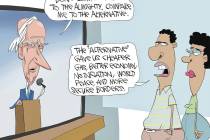EDITORIAL: Forfeiting assets, forfeiting rights
It was never about justice. It was always about the money.
Sports bettor Glen Cobb and three of his family members struck a deal to end what might have been the most expensive and abusive misdemeanor prosecution in American history. The 50-year-old Cobb pleaded guilty Monday to two counts of accessory after the fact-transmission of wagering information, and his mother, father and step-daughter pleaded guilty to one count each of the same crime in Las Vegas federal court. As part of the deal, they also agreed to forfeit $4.3 million in cash that already had been seized by the government.
That’s an outrageous penalty for misdemeanor offenses, but perhaps not enough to recover the untold millions of dollars spent by the U.S. attorney’s office and the Internal Revenue Service on the case over 13 years.
You read that correctly. The federal government began this investigation (and we use that term loosely) in 2002. And after 13 years of deploying vindictive pressure, after multiple grand jury indictments against Cobb and his family related to illegal sports betting, and after trying to shroud the case in complete secrecy — even from the defendants — prosecutors decided their case wasn’t worth wagering easy money. They thought so little of their chances of winning felony convictions in court that they cashed out.
Of course, prosecutors were able to leverage that much money because the odds were overwhelmingly in their favor. Defendants fight the Justice Department and the IRS at their peril; unlike Washington, their resources are limited. And they can’t defend themselves if prosecutors have seized their assets before the prosecution even starts.
In 2013, IRS and Secret Service agents confiscated $13.2 million from the Cobbs. Bank accounts were drained, safes were emptied, property was taken. Search warrants authorized by U.S. Magistrate Judge Cam Ferenbach allowed the agents to take just $4 million, but they seized more than triple that amount. How could they get away with what amounts to theft? Forfeiture laws allow governments to take and keep assets they believe were obtained through criminal means, even if no criminal charges are ever filed.
When attorneys for the Cobbs demanded that the money be returned, the government responded by trying to conduct the forfeiture under “super seal.” A little-known court process overseen by the federal clerk, “super sealing” puts cases and their documents in a court vault and prevents their upload to a digital case management system. This prevents anyone — even defendants — from reviewing a case.
When there is no openness in our courts, there is no justice.
But, again, the Cobbs’ case was never about justice. Federal prosecutors, with the support of federal judges, do not exercise discretion — the Cobbs were gamblers, not terrorism suspects. The Justice Department crushes defendants simply because it can.
“Super sealing,” like asset forfeiture itself, flies in the face of due process and the U.S. Constitution. Last year, Judge Ferenbach blasted prosecutors’ treatment of the Cobbs, saying the court was being asked to “allow the deprivation of their property and deny them a process to redress possible violations of their constitutional rights through a secret government action that provides no notice or opportunity to be heard.” But the U.S. attorney’s office held onto the money because, under forfeiture laws, defendants bear the burden of proving they obtained their property lawfully to get it back. (Once the Cobbs were indicted, their assets were kept under criminal provisions.)
So the Cobbs pleaded guilty and gave up more than $4 million to get back $9 million taken two years ago.
The Cobbs admitted to placing illegal sports bets across state and international lines through offshore books, which highlights the folly of prohibitionary policies. Bans don’t work. But the Cobbs’ case also clarifies the need for reforms to the asset forfeiture and super-sealing rackets that thrive within the federal justice system. All proceedings should be open. And the government should not be able to take anyone’s possessions prior to conviction.
Until Congress defends our rights, federal courts will abuse them.























